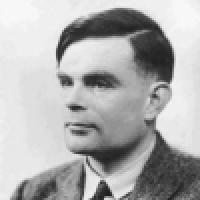
Plus Advent Calendar Door #20: Celebrating Alan Turing
On the 23rd of June this year Alan Turing would have celebrated his 100th birthday. During his short and tragic life he revolutionised the scientific world and so 2012 was declared Turing Year. We're sad to see that an official pardon for his 1952 conviction for homosexuality, which was then illegal, still hasn't been granted. But that hasn't stopped us from celebrating his life and scientific achievements. See all our articles related to his work below.
If you're a secondary school student then you can join the Alan Turing Cryptography Competition run by the School of Mathematics at the University of Manchester. It involves a story of six chapters, following the exploits of two children, Mike and Ellie, who get involved in a cryptographic adventure involving a mysterious ancient artifact — the Egyptian Enigma! Every two weeks, starting on Monday 7th January, a new chapter of the story will be released on the website. Each of the six chapters contains a code to be solved. Teams of at most four students have to solve these codes as fast as they can and submit their answers on the competition website.
There are some great prizes for the three top-placed teams at the end of the competition. There will also be a prize for the first team to solve each chapter and a number of spot prizes awarded throughout the competition. See the competition website for details.
Alan Turing: ahead of his time
Alan Turing is the father of computer science and contributed significantly to the WW2 effort, but his life came to a tragic end. This article explores his story.
Another look at Turing's life and work. Find out what types of numbers we can't count and why there are limits on what can be achieved with Turing machines.
How does the uniform ball of cells that make up an embryo differentiate to create the dramatic patterns of a zebra or leopard? How come there are spotty animals with stripy tails, but no stripy animals with spotty tails? The answer comes from an ingenious mathematical model developed by Alan Turing.
Omega and why maths has no TOEs
Is there a Theory of Everything for mathematics? Gregory Chaitin thinks there isn't and Turing's famous halting problem plays an important part in his work.
Turing is most famous for his work as a WWII code breaker. This article looks at the efforts of all the code breakers at Bletchley Park, which historians believe shortened the war by two years.
A version of Turing's famous test – the "Completely automated public Turing test to tell computers and humans apart", or CAPTCHA for short – helps in the fight against the everyday evil of spam email.
Turing's scientific legacy is going stronger than ever. An example is an announcement from February this year that scientists have devised a biological computer, based on an idea first described by Turing in the 1930s.
Did a philosopher kill WALL-E?
AI has become big business in Hollywood, but will we ever see the computers reliably pass the Turing test? Or is it philosophically impossible?